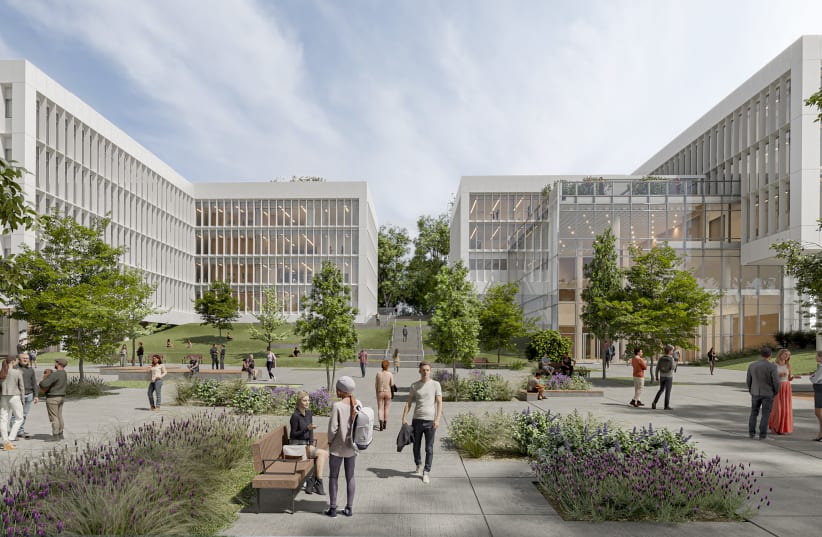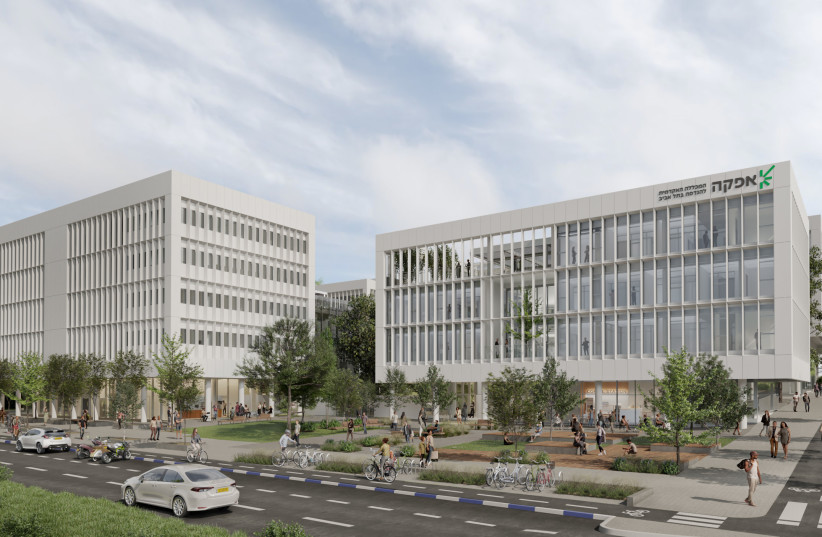Construction starting soon on new south Tel Aviv campus of Afeka Academic College of Engineering – aiming to increase number of engineers in Israel, strengthen area, and inspire local youth to pursue higher education.
For Prof. Ami Moyal, president of Afeka Academic College of Engineering in Tel Aviv, construction of the college’s new campus in the southeast Tel Aviv neighborhood of Yad Eliyahu, slated to begin within a few months, is far more than a matter of bricks and mortar.
In Moyal’s words, “The campus, which is being built in partnership with the Tel Aviv Municipality and with the support of the Israeli Council for Higher Education, will have national, societal, economic, urban, and educational significance for the entire State of Israel.”
The first stage of the campus construction will include four buildings spread over an area of 16,000 square meters, with a large public square at the campus entrance that will blend in with the surrounding neighborhood. A commercial area will surround the campus, which will include a large underground parking area.
The second stage of construction will add additional buildings and dormitory housing for hundreds of students.Moyal is not exaggerating in his estimation of the importance of the move, and he explains why. “There is a great shortage of engineers in our country,” he says. “Building and moving to the new campus will enable us to grow significantly from 3,300 to 5,000 students in the first stage and even more later.”
Over the past five years, the Israel Innovation Authority has reported an annual shortage of between 13,000 and 20,000 engineers and programmers. The lack of engineers in Israel, Moyal points out, is an obstacle to the country’s economic development and national resilience. Adding more engineers to the country’s workforce is crucial for Israel’s hi-tech industry and economic future.
Discussing the societal impact of the move from north Tel Aviv to south Tel Aviv, which is expected to take place in 2026, Moyal notes that compared to the northern part of the city, there is a large socioeconomic discrepancy, as well as an unjustifiably higher percentage of residents with no matriculation, and a lower percentage of residents with academic degrees.
He expects that the proximity of the new campus to middle schools and high schools in Yad Eliyahu will have a positive impact on neighborhood youth. In addition, he points out, dormitories will be added to the campus in the second stage of construction, which will enable students from Israel’s geographical periphery to attend Afeka without having to bear the high cost of renting in Tel Aviv.
On an economic level, Moyal cites estimations to the effect that the work of every engineer in the State of Israel contributes $250,000 annually to the country’s gross national product. “If we train thousands more engineers,” he says, “it will add hundreds of millions of shekels to the country’s economy.”
There is also a great deal of significance to the move within the urban and educational framework of Tel Aviv itself, he explains. “We are relocating 5,000 people, including students, faculty, and staff, to the southern part of Tel Aviv. Placing an institution of higher education in an underdeveloped area will trigger progress and help the neighborhood blossom. We want to create an academic, scientific, and educational ecosystem that serves as an example for the youth in south Tel Aviv and inspires them to study engineering or any other field they are interested in.”
Moyal says that increasing opportunities for residents of the country’s geographical and socioeconomic periphery, as well as for women to enter the field of engineering, is a national mission.
FOR THE the college itself, the move is expected not only to increase the number of students but also to reflect the educational changes in the way that students learn at Afeka.
Moyal says the most important skills cited by hi-tech companies seeking engineers are personal skills, such as teamwork, critical thinking, self-learning, and effective communication.
Afeka has addressed these issues, he says, by updating its curriculum and modifying its pedagogical methods. Many classes are no longer taught through traditional frontal lectures, with the students sitting in rows of desks and the teacher standing at the front of the room. Instead, courses are taught through project-based learning, both in and outside the classroom.
An extensive array of extracurricular activities is offered to students, and external partnerships have been built, forming an ecosystem that includes industry, the educational system, NGOs, the IDF, municipalities, hospitals, and more.
“We implemented a profound multi-year institutional change that, in effect, will never actually end,” said Moyal, “because the world around us is constantly changing, and we must continuously provide our students with a relevant educational process.”
These educational methods will be integrated into the new campus, Moyal says. “The new campus is being planned to support modern educational processes,” he explains. “Classrooms have not changed in 200 years since the Industrial Revolution. Today, we are teaching differently and learning differently. Students learn in groups and work on projects, study throughout the campus, whether outside or in designated informal learning spaces. The entire educational infrastructure for teaching and learning has changed.”
ALL OF these changes reflect Afeka Academic College of Engineering’s educational outlook, says Moyal.“Today, especially in the era of artificial intelligence and the infiltration of tools such as ChatGPT, the world has changed.” ChatGPT can help students do the basics, he points out, “but engineers need to employ critical thinking skills and creativity, speak English at a high level, and have the skills to work in multidisciplinary teams.
“These skills are becoming more and more important,” he asserts. “How does one acquire these skills,” he asks rhetorically. “Not by sitting through frontal lectures.”
He points out that some of the pedagogical changes at Afeka also reflect the needs of the current generation of engineering students. “Today’s generation of students is not interested in listening to long lectures. Our new campus will enable us to incorporate different educational experiences,” he says. Moyal views the education that students will receive at Afeka, not only as a tool for developing their skills for the employment market but also as something that will advance them on a personal level – “to become thinking people in the world,” as he puts it.
It is for this reason, he notes, that Afeka sends students for educational experiences and missions outside Israel in order to help them gain a better perspective on different cultures and ways of thinking.
All of these concepts, such as new forms of educational instruction and sharpening students’ skills to increase their creativity and other vital skills, are intended to enhance and improve the overall educational experience, says Moyal. “Students can’t be excellent if they do not enjoy their studies. We have to give them an enjoyable experience. If they are more curious, they will ultimately become better engineers.”
In designing the new state-of-the-art campus, which was a two-year process, Afeka has been presented with a unique opportunity to inspire and create significant changes in how engineers are taught and educated.
“It is rare for an academic institute to have the opportunity to build a campus from scratch,” says Moyal. “Usually, campuses are built gradually over time, and things are added and patched together. Now we can plan everything from the outset with a modern approach that will suit modern educational methods.”
Prof. Ami Moyal and Afeka Academic College of Engineering take the mission of educating Israel’s next generation of engineers very seriously. “We are educating the next generation of engineers and technology leaders in the State of Israel. This is a major responsibility.”
This article was written in cooperation with Afeka Academic College of Engineering in Tel Aviv.


